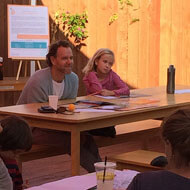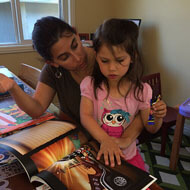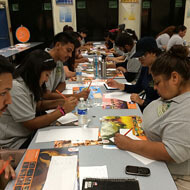Digital media has growing impact on kids’ health
With the ever-evolving and increasingly accessible digital and media landscape, health and media advocates convened a symposium Thursday in Washington, D.C., to address the cognitive, social and emotional impact of media on children’s lives.
Rising obesity rates, incidents of cyber-bulling and other challenges reflect the growing impact of media on the health and well-being of children as a public health concern.
“Kids are tech savvy and judgment poor,” stated Jon Leibowitz, chairman of the Federal Trade Commission. This can be a dangerous combination.
While technology can certainly be a wonderful learning tool and opportunity for self-expression of children, advocates recognized that safeguards need to be in place to protect children from certain vulnerabilities so they are operating in a safe environment.
They spoke about growing issues over privacy concerns, particularly in this “self-revealing” era in which kids today are growing up. Whatever they text or post can be searched, copied, pasted, distributed and viewed by vast invisible audiences. Their activities and personal information are often being tracked and traced with cookies and other tracking technologies, without their knowledge.
Sen. Richard Blumenthal, D-Conn., joked, “If they had Facebook when I was in high school, I likely would not be in Congress today.”
And others feared posts lacking judgment negatively affecting their children’s chances of getting into good colleges.
That is why there is an urge for a new public policy agenda to protect the privacy of children and teens, as outlined in a brief by Common Sense Media, host of the Capitol Hill symposium. Among other things, such an agenda would not track kids online; allow parents and kids to delete online information; not permit behavioral marketing to kids; and require an “opt in” privacy standard — especially for kids.
On the federal level, panelists discussed the need for the implementation of sound legislation to hold companies to certain standards. However, they recognized that the responsibility cannot rest solely with the government, but must come from a partnership with parents, schools — where children spend so much of their time — and the community.
In addition to the concerns of privacy, Deborah Milligan, MD, chair of the American Academy of Pediatrics Council on Communications and Media, discussed from a pediatrician’s point of view, the concerns over too much screen time and other challenges as outlined in the academy’s report, “The Impact of Social Media Use on Children, Adolescents and Families.”
She said enormous amounts of time are being spent in this isolating act of sitting in front of a screen, as opposed to playing outside. Aside from the sedentary nature and concerns over childhood obesity, from a mental health standpoint, there is also new emerging research around linkages of mental health and social media. Comparing self to others’ profile pages could potentially lead to what the pediatricians have termed as “Facebook depression.” Threats of cyber-bullying can also lead to mental anguish among teens, and sometimes go unaddressed if parents or school officials are unaware.
Panelists stressed the need for further research regarding health connections to technology and media, so it can be most appropriately addressed, such as how media consumption and targeted advertising can be linked to childhood obesity.
Speakers also discussed the issue of healthy media images for girls. They underscored the need for positive role models on the screen, and in advertisements, in which females are not hyper-sexualized or valued solely for their looks, but portrayed in roles of strength and for their intellectual capacity.
“Media is not going away, so how can we use it to make our children better citizens?” asked Ellen Wartella, professor of communications studies at Northwestern University.
Engaging adolescents in conversation is key to finding solutions, panelists noted. As technology is rapidly changing, general awareness among parents is important as well as setting certain guidelines. Parents should be an example of how to properly use technology, such as designating dinner time as devoted to talking with no cell phones and no screen time.
Try to have an open dialogue with your children, urged Ivor Braden Horn, MD, MPH, associate professor of pediatrics at George Washington University School of Medicine. She said to listen to your kids, and observe signs of things they don’t say. In addition, parents are prime role models for their children regarding body perception and promoting healthy lifestyles.
While still fostering a spirit of innovation and the advancements of technology, the symposium acknowledged the need to critically think about the impact of media on the health and well-being of impressionable children, with the need for certain safeguards and general awareness. There was a call for stronger research, partnerships and open dialogue, as society grapples with these public health concerns emerging from this new digital era and those most vulnerable.

Enter Our Contest
To Submit your WRiTE BRAiN BOOK for a chance to win a real publishing deal.
To Enter
Go to the last page of any of your completed WRiTE BRAiN BOOKS.
At the Bottom of the chalk board, type our email address
[email protected]
into the empty field and click "share my book."
All of your WRiTE BRAiN BOOKS can be found in the My Books tab
under Book Builder in our Main Navigation.
OR
Simply email the short link to your digital book to
[email protected]
You can find the short link on the receipt of any confirmed book order.
Thank you for your interest! Please forgive us...

Our app isn’t quite ready yet. We are polishing and fixing a few bugs to make sure you have the best, most seamless user experience possible. If you’d like us to let you know when its done we’ll send you a link to the FREE APP the minute it's ready to go!
I WANT A LINK TO THE FREE WRiTE BRAiN APP WHEN ITS COMPLETE! Please enter your email address!
*We will not publish, share, or sell your email address in any way. We hate spam just as much as you do and will not spam your email. We would love to share details on the progress/completion of our site in an occasional digital note. However, you will always have the option to opt-out.































































